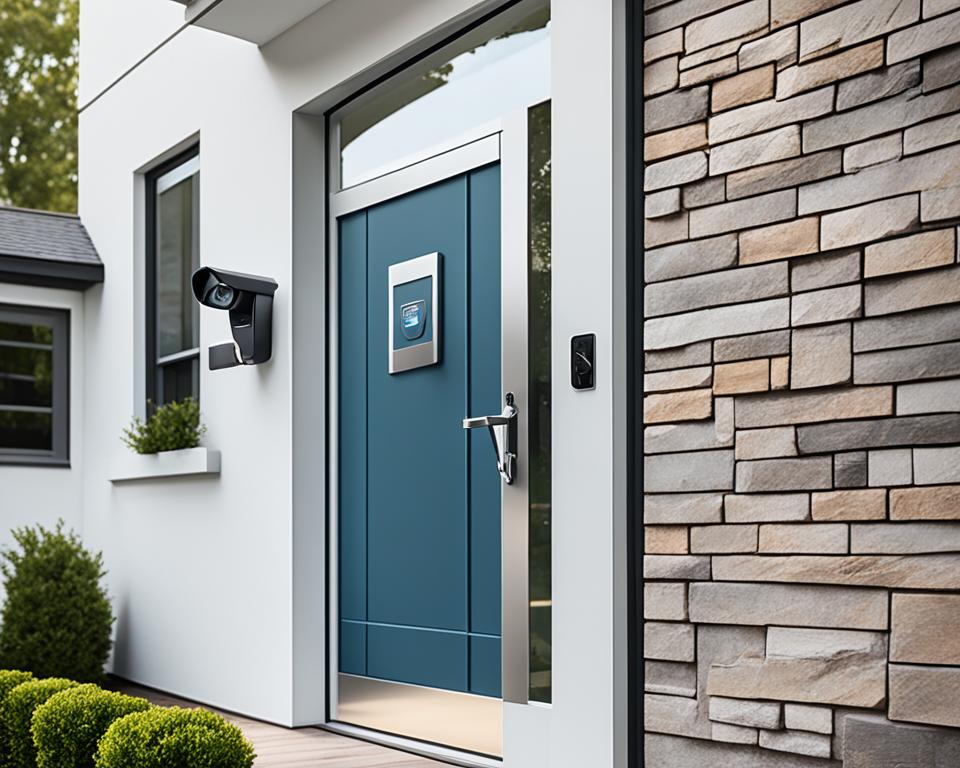Being a thoughtful homeowner means protecting your home – your most valued possession. Elite homeowners’ insurance offers enhanced protection. You can enjoy coverage specifically designed for you. This guide dives into the main benefits of homeowners’ insurance. It covers key points like coverage limits and liability protection. Also, we’ll look at replacement cost coverage and how claims are handled. This knowledge will help you make smart choices for your home’s safety.
Key Takeaways
- Homeowners’ insurance provides comprehensive coverage to protect your most valuable asset – your home.
- Understanding coverage limits, liability protection, and replacement cost coverage is essential for securing the right policy.
- Navigating the insurance claims process efficiently can ensure timely resolution of covered losses.
- Selecting appropriate deductibles and liability limits can help balance your financial responsibility and insurance coverage.
- Exploring the full range of homeowners’ insurance benefits, from natural disaster protection to personal injury coverage, can provide the ultimate peace of mind.
Understanding the Importance of Homeowners’ Insurance
Your home is likely your most valued asset as a homeowner.1 Homeowners’ insurance is key in protecting it. It guards against financial risks like natural disasters, theft, and personal liability. Thus, you get the peace of mind you deserve.
Protecting Your Most Valuable Asset
Your home is more than a building. It’s a sign of your hard work, holds memories, and is a safe place for you and your family.1 Homeowners’ insurance makes sure your house can be fixed or rebuilt if it gets damaged. This keeps your investment safe and helps keep the comfort and security you’ve worked for.
Mitigating Financial Risks
2 Homeowners’ insurance protects against many risks of owning a home. These include natural disasters, theft, and personal liability. It saves you from big financial hits that might come suddenly. With a good policy, your home and belongings are safe. Plus, your financial health is protected.
Providing Peace of Mind
Homeowners’ insurance gives you peace when things go wrong.1 Knowing your home and belongings are safe lets you focus on life. This peace lets you enjoy your home and the world you’ve built. You feel ready for any challenges that might happen.
Comprehensive Coverage Limits
Being a smart homeowner, I know how crucial it is to have a top-notch policy. This policy offers different coverage limits to meet my various needs.3
Dwelling Coverage
Dwelling coverage is key in my policy. It protects my home’s structure. If a fire or a disaster hits, this lets me fix or rebuild my home.34
Personal Property Protection
My policy doesn’t just cover the house. It also guards my personal belongings. This includes my furniture, gadgets, and clothes in case they are stolen or damaged.34
Liability Protection
Liability protection is also crucial. It defends me if someone gets hurt or their stuff is damaged on my property. So, if a friend falls or a neighbor’s fence breaks, I’m covered.34
Understanding these coverage limits helps me choose the right policy. It ensures my home and assets are well-protected against many risks. This way, I’m ready for whatever comes my way.

Homeowners’ Insurance Benefits
As a homeowner, insurance does more than protect your home’s structure. It offers many coverages to safeguard your property and finance. So, let’s look into how it boosts your property protection.
Replacement Cost Coverage
Homeowners’ insurance includes replacement cost coverage. This makes sure your home and belongings get fixed to their original state, even if it costs more than the policy covers.5 An extended policy might pay 20 to 25 percent above the limit for rebuilding. This gives you extra protection.5 And if you have a guaranteed replacement cost policy, it pays the total cost to rebuild, without deducting for depreciation.5
Additional Living Expenses
If a covered event makes your home unlivable, insurance helps. It covers additional living expenses like hotels and meals while you repair or rebuild.6 This coverage keeps your life comfortable during tough times.7
Medical Payments Coverage
Accidents may occur on your property. Medical payments coverage helps with guests’ medical bills due to injuries at your place.6 It offers a safety net from $1,000 to $5,000 for you and your guests.6
Knowing all the benefits lets you pick the right coverage for your needs. From replacement costs to living expenses and medical payments, these protections provide peace of mind.
Protecting Your Personal Belongings
Homeowners’ insurance does more than protect your home. It keeps your personal items safe, too.8 This is called personal property coverage, noted as Coverage C on your policy. It looks after your important items.8
Scheduled Personal Property Coverage
Standard homeowners insurance takes care of common items like clothes, TVs, and furniture.8 But, it might not cover everything, especially if they’re very valuable.8 This is where scheduled personal property coverage helps. It adds more protection for costly things like jewelry and art.8 It makes sure your special items are safe from loss, theft, or damage. Even if they’re worth more than your usual policy covers.8
Off-Premises Coverage
Off-premises coverage is another key part of homeowners’ insurance. It protects your items even when they’re outside your home.9 Your policy might pay for lost or stolen items worldwide, up to 10% of your total limit.9 This means if something like a laptop is stolen or jewelry goes missing on a trip, you can get help with replacing them.10 Even your big furniture and electronics are usually covered if they’re stolen or damaged elsewhere.10

Understanding the benefit of special property and off-premises coverage helps you get the right homeowners’ insurance. It ensures all your belongings are covered well, no matter where they are.8109
Natural Disaster Coverage
As a homeowner, it’s key to ensure your property is safe from natural disasters. Most homeowners’ insurance covers floods and earthquakes. This insurance helps protect your finances when disasters strike.11
Flood Insurance
Flood insurance is a must-have for disaster coverage. It protects your home and items from water damage. The National Flood Insurance Program (NFIP) charges about $859 yearly for this. This price does not include private flood policies.12 There, the average flood claim paid has been around $69,000 in the last five years. This shows how vital flood insurance is.11
Earthquake Coverage
Earthquake insurance is critical for homeowners. It costs around $850 each year. The price can change based on your home’s details. Since nearly half of U.S. states face earthquake risks, this coverage is important. It provides the money needed to rebuild after a quake.1311
Know the natural disaster risks in your area. Make sure your insurance covers these risks.This gives you peace of mind. You’ll know your home is protected from severe damage caused by unpredictable events.131211
Theft and Vandalism Protection
Protecting my home from theft and vandalism is very important. My homeowner’s insurance covers theft protection and vandalism protection. This coverage gives me peace of mind.
Most home insurance policies include vandalism. But, they might need specific steps for when a home is empty for long. These acts range from spray paint to eggs on houses.14
If my house suffers vandalism, a detailed police report is needed for the insurance claim. It’s best not to fix any damage until the insurance adjuster sees it.14
My insurance also covers vandalism like graffiti and arson. But, some cases are not covered, like if my home is empty for over 60 days. Or if I use my home for business.15
Learning about my policy’s theft and vandalism protection is important. It ensures my home and belongings are safe. This includes knowing what my insurance does and doesn’t cover.1415

| Covered Vandalism Acts | Exceptions to Coverage |
|---|---|
| Graffiti, arson, smashing locks/windows, damaging lawns, cutting down trees | Home vacant for over 60 days, running a business from home |
Personal Injury Protection
If you are a careful homeowner, your insurance policy should do more than protect you from physical harm. It should also guard against accusations of16 libel, slander, and invasions of privacy. This ensures your finances aren’t drained by legal costs or settlements. It means your home and name are covered from various risks.
Libel and Slander Coverage
This part of the policy helps if someone accuses you of harming their reputation, false imprisonment, or invading their privacy16. It pays for your legal defense costs. So, you won’t face these claim costs on your own16.
Invasion of Privacy Coverage
Nowadays, what we do online can lead to big challenges. This insurance defends you from lawsuits related to online actions16. It’s especially useful for landlords. It can protect them when accused of privacy violations16.
Do remember, this coverage doesn’t help if you knowingly did something wrong or illegal16. But, knowing your insurance protects you from many dangers brings peace of mind. Your home and reputation are secured against numerous liabilities.
Replacement Cost Value vs. Actual Cash Value
It’s wise to know the difference between replacement cost value and actual cash value.17 When you have replacement cost coverage, you can buy new stuff if your things are damaged or lost. You get to replace items without factoring in depreciation.17 It might cost more upfront, but it offers better protection.17
Understanding the Difference
18 Replacement cost covers the full price of new items if you need to make a claim.17 This is good because you don’t lose money on depreciation when replacing your stuff.18 But actual cash value looks at how much the item has decreased in value. So, you might get less money to replace your item compared to what you originally paid.18 With replacement cost, you get enough money to buy a new item just like the old one. Actual cash value only pays out what the old item is now worth.18
Choosing the Right Coverage Option
When picking coverage, think about your budget and how much risk you want to take.17 Replacement cost doesn’t reduce your payout for depreciation, which is cool. But actual cash value brings down how much you get based on your items’ reduced value.18 Also, some policies only pay for a new roof if the old one was younger than 15 years. For older roofs, they might just pay the depreciated value. Unless, of course, you paid extra to upgrade.
18 There’s also extra coverage you can get. For example, extended replacement cost can boost your coverage in a disaster by 25% to 50%. And guaranteed replacement cost would cover the full rebuilding cost of your home, no matter what. It’s important to really think about these options to protect your home and belongings better.

The Insurance Claims Process
If you own a home, it’s vital to know about the insurance claims process in case of damage.19 Dealing with insurance claims can be hard and take time. It often includes several payments and steps as your home is repaired or rebuilt.19 But by learning the steps and working with your insurer, you can get through it smoothly and quickly.
Filing a Claim
First, tell your insurance company about the damage right away.20 The company suggests quick reporting to start the process efficiently.20 Be sure to show what happened with photos or videos.20 They say this visual proof is really important.
Working with Your Insurance Provider
After filing your claim, it’s important to stay in touch with your insurer.21 You’re usually required to file a claim within a year of the damage. So, don’t miss your deadline.21 You might need to prove you bought items before they can be fully replaced.21 The insurance company usually asks for these receipts to fully cover your costs.21
19 Sometimes, there might be disagreements on the damage amount. This could lead to needing a mediator or arbitrator to help settle things.19 When two different appraisers check the damage, they’re looking at the costs, not policy details. But any extra costs might be your responsibility, according to Maryland law.19 Arbitration is another way disputes get solved without going to court. A neutral person makes the final decision in this case.19 And if your claim is denied, you may be able to go through arbitration or a lawsuit, depending on your policy.19 Always remember, the Maryland Insurance Administration can help if you’re unhappy with your claim outcome.19
21 If your home is a total loss, the insurance should pay out the maximum amount you’re covered for.21 In some cases, your money might be held in an account for repairs. Or, the insurance can pay repair companies directly.21 You might get checks for living expenses. The first one for damaged things is usually the item’s current value, not the full price.21
20 Claim times can vary, and not all the insurance companies offer the same service speed.20 There might be help for living elsewhere if needed, showing how useful home insurance can be.20 After the claim pro checks your damage, you could get paid quickly. This shows a fast part of the claim process.20 Sometimes, if your house is not livable, the insurance might pay for extra expenses like staying in hotels or renting cars, proving they can cover a lot of needs.20 It’s smart to keep all your repair and living expense receipts. They might ask for these during the claim process.20 Also, remember there’s coverage for not being able to live in your home, which is a special part of your insurance policy for these cases.20
Choosing the Right Deductibles and Liability Limits
As a smart homeowner, it’s key to pick the right deductibles and liability limits. Deductibles are what you pay first before insurance steps in. They often go from $100 to $5,000, but around $1,000 is usual.
You can also go for deductibles that are a percentage of your home’s value. They usually range from 1% to 10%.
Liability limits decide the most your insurance covers for claims. This protection is crucial if someone gets hurt on your property or you’re sued for home damages. By thinking about your money and possible dangers, you can find the best mix of deductibles and liability limits.
Changing your deductibles can really change how much you pay. Increasing from a $1,000 to a $2,500 deductible might cut 13% off your premium.22 But, be careful. Just one claim can bump your cost by 9% on average.
Special insurance policies like for flood and earthquake can have their own deductibles. For instance, flood deductibles run from $1,000 to $10,000 and depend on your risk of earthquakes for earthquake insurance.
These unique deductibles could significantly hit your wallet if a disaster happens.
By picking your deductibles and liability limits wisely, you get a policy that fully protects your home and savings. Plus, you can save money on premiums too.
Conclusion
In conclusion, homeowners’ insurance is vital for your home’s safety. It helps protect your home, your belongings, and your finances. By choosing the right plan and working closely with your insurance company, you’ll have peace of mind.23
Know what your policy covers, what benefits it offers, and how to make claims. This way, you make sure you’re ready for any unexpected twist.24
Remember, owning a home comes with risks. That’s why homeowners’ insurance is crucial. It’s not just a requirement; it’s a smart choice for your future.23
Make sure you fully understand what your policy includes and the benefits it comes with. Working closely with your insurance provider is key. It ensures your home and belongings are safe from a variety of threats.24
FAQ
What are the key benefits of homeowners’ insurance?
What are the coverage limits in homeowners’ insurance?
How does replacement cost coverage work?
What is the difference between replacement cost value and actual cash value?
How does the insurance claims process work?
How do I choose the right deductibles and liability limits?
What type of natural disaster coverage does homeowners’ insurance provide?
Does homeowners’ insurance cover theft and vandalism?
What kind of personal injury protection does homeowners’ insurance offer?
How does off-premises coverage protect my personal belongings?
Source Links
- https://content.naic.org/cipr-topics/homeowners-insurance
- https://www.investopedia.com/insurance/homeowners-insurance-guide/
- https://www.usnews.com/insurance/homeowners-insurance/what-does-homeowners-insurance-cover
- https://www.statefarm.com/simple-insights/residence/what-is-homeowners-insurance-and-what-does-it-cover
- https://www.iii.org/article/homeowners-insurance-basics
- https://www.nerdwallet.com/article/insurance/understanding-homeowners-insurance
- https://www.doi.sc.gov/963/Understanding-Basic-Homeowners-Insurance
- https://www.credible.com/blog/home-insurance/personal-property-coverage/
- https://www.nerdwallet.com/article/insurance/personal-property-insurance
- https://www.trustage.com/learn/property-insurance/does-home-insurance-cover-personal-property
- https://www.bankrate.com/insurance/homeowners-insurance/what-disasters-does-homeowners-insurance-cover/
- https://www.tdi.texas.gov/consumer/storms/home-damaged-faq.html
- https://www.forbes.com/advisor/homeowners-insurance/ready-for-natural-disaster/
- https://www.amfam.com/resources/articles/at-home/does-home-insurance-cover-vandalism
- https://www.policygenius.com/homeowners-insurance/does-homeowners-insurance-cover-vandalism/
- https://www.amfam.com/resources/articles/understanding-insurance/what-is-personal-injury-insurance
- https://www.nerdwallet.com/article/insurance/actual-cash-value-vs-replacement-cost
- https://www.policygenius.com/homeowners-insurance/actual-cash-value-vs-replacement-cost/
- https://insurance.maryland.gov/Consumer/Documents/publicnew/DETERMINING-COVERAGE.pdf
- https://www.travelers.com/resources/home/insuring/how-the-home-insurance-claim-process-works
- https://www.iii.org/article/understanding-the-insurance-claims-payment-process
- https://www.nerdwallet.com/article/insurance/homeowners-insurance-deductible
- https://www.kiplinger.com/personal-finance/home-insurance/do-you-need-home-insurance
- https://www.travelers.com/resources/home/insuring/do-i-need-homeowners-insurance-and-when-should-i-buy-it
